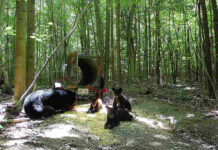“Our town was too small to have a village idiot, so we took turns.” — Paul Carl, 1907-1994
Part five — series finale
The stories shared by Paul Carl of growing up in the village which I have always called home provide a glimpse in to such a sweet and innocent time, when getting in trouble meant tipping an outhouse or rigging the school bell to mysteriously ring from afar.
Loving the great outdoors, Carl’s grandfather often took him fishing, and he tells of landing a big snapping turtle that weighed over 25 pounds. They sold it to the leading hotel of the area, located in the county seat of Ashland.
“I went with him on the train to deliver it and we carried it in a gunny sack from the station to the hotel six blocks away. What an adventure for an 8-year-old.”
Explorers
Entertainment was created, not merely watched.
“It really didn’t make any difference to us kids that we had no radios or TV — there were so many interesting things to do around town,” he writes in a writing he named An Epistle from Paul.
Carl and his buddies would explore Planks Flour Mill, all four or five floors, until the miller chased them out.
Then on to the saw mill “to watch the saw eat through the big hardwood logs and see the sawdust blown to the pile outside which was fun to slide down.”
They enjoyed the two blacksmith shops, the more jovial Edmonson Brother’s the favorite, where youngsters were welcome to watch them shoe horses and once in awhile got to turn on the blower on the forge.
Train
The railroad station held the fascination of all children then — the big steam locomotive chugging to a stop, bell ringing and whistle blowing.
It was the day to be there when local farmers drove their livestock to the stockyards on the railroad. Imagine the almost circus-like atmosphere that day would bring.
Many times the boys would try to steal a ride on a railroad car while the switch engine was pushing cars onto various sidings, until someone spotted them and rail crews chased them away.
If the boys had a few pennies to spend, they would buy Hershey Kisses at Winbiglers Drug Store and look over the owner’s collection of stuffed birds and small animals, or walk to Bine Winbigler’s store for penny candy.
“A Regina music box sat on his counter with a big brass disc with zillions of holes in it that rotated and produced a tinny sound…it was quite an attraction for the penny candy trade,” Carl writes.
Living life
A fellow who clearly enjoyed school, he writes of a geography teacher who inspired in him a desire to see the exotic places studied.
He visited 48 of our 50 states, visited every continent and crossed every ocean around the world.
A year-round job this young lad felt lucky to land was as sexton of Jeromesville’s Trinity Lutheran Church. He would light the gas furnace on Saturday morning so the church would be warm for Sunday service, dust the pews and tidy up.
On Sunday morning he would ring the church bell four different times to summon the congregation, “a job I liked and the pay was good — $1 a week.”
He would help at his father’s hardware store, where a large wood stove with several chairs around it attracted a group of loafers in winter time.
“I called the group ‘The Spit and Whittle Club’ — a large spittoon was provided for the tobacco chewers which they seldom hit. I think their aim was poor.”
Children
An interesting observation Carl makes in his writing is that the Spit and Whittle Club often talked of how bad children were becoming, civilization surely doomed.
In the next breath, though, they bragged on their own conquests and ornery adventures of youth.
On reflection, he said, “I still have faith in today’s kids — any generation that could come through the trauma of the ’60s can make it anytime. There’s nothing wrong with the younger generation that being a parent and taxpayer won’t cure.”
The rest of the series
- Part one: Buying local pushed in 1924
- Part two: Roots run deep in the community
- Part three: Rural people known by nicknames
- Part four: Growing up small-town proved invaluable for our ancestors













